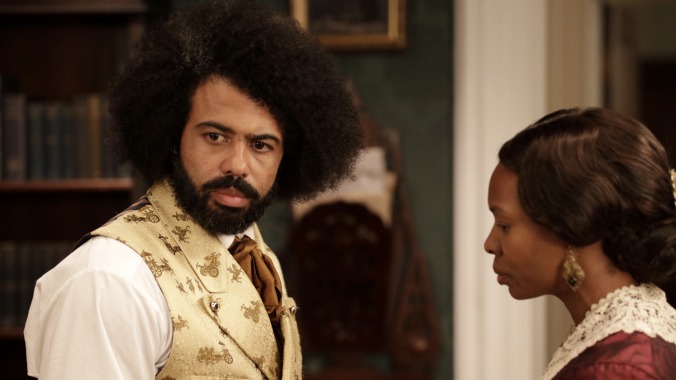I’ll admit that when I first saw that Daveed Diggs was playing Douglass on this show, I was a little nervous. But Diggs is a ton of fun here, presenting the widely-acclaimed author, inventor, and civil rights leader as being, yes, all of those things, but also an eloquent horny buffoon who lives in a throuple. (I haven’t read James McBride’s original novel, but my understanding is that this is basically the characterization there.) It works, largely because Diggs is very good at playing self-important historical tomcats—and because when he’s first introduced, the episode (and Diggs) establishes him as an accomplished orator, someone who has polite society in the palm of his hand.
“Mister Fred” has a dangerous line to walk—it would be very easy for the episode to be caught in either condemning violence entirely in a civility-fueled, milquetoast delusion or aggressively siding with John Brown as a white man telling Frederick Douglass what to do. Douglass himself points this out in a tense dinner table conversation. It’s Diggs’ most intense, most earnest moment of the episode.
But there are a few other ways that the episode manages to be both funny and a genuine exploration of this conflict. First, there’s Onion, who, as in earlier episodes, serves as a more rational counterbalance to the history happening around him. (As Douglass tells him, “Do you know that you are not talking to a pork chop, but rather a fairly considerable and incorrigible piece of the American Negro diaspora?”) Second, there are the two women in Douglass’ life, his wife Anna and German abolitionist Ottilie Assing (with whom the historical Douglass very possibly had a romantic relationship). They have a mirror version of Douglass’ argument with Brown. But in this case, it’s the white woman who claims that Brown is crazy and motivated solely by his own desires, and the Black one who accepts the necessity of his methods.
This is pretty complex, but, to my mind, the point is in the argument itself, and in the many contradictions of trying to live your values. At the beginning of the episode, Brown tries to console the widow of one of his men, and spends some time apologizing to the baby: “You’ll be so proud of your father one day.” There’s a clear-cut response here—dying in service to the abolitionist cause is admirable—but, of course, the child won’t experience it that way. No one ever experiences these kinds of ideological debates as pure debates, unless they have no skin in the game. People describe the sort of language that Brown uses, and that Douglass relies on, as “lofty” for a reason: it exists, in some way, above the day-to-day struggles of living. It allows you to be, as Onion puts it, “a kind of hero in your own mind.”
Okay, that sounds heavy, and it is. But the end of “Mister Fred” turns The Good Lord Bird into a full-on farce, in one of the silliest sequences the show has done yet. Here, Onion and Douglass get drunk, drinking to the enslaved dogs, cats, and goats. The comedy is, unfortunately, woven together with tragedy—Onion has clearly developed a drinking problem, and sustains the absurdity in part because he wants to keep nipping at Douglass’ alcohol. And, in narration, Onion somberly notes that Douglass will betray the old man.
Stray observations:
- “Mister Fred” is written by Erika L. Johnson and Jeff Augustin and directed by Darnell Martin, who has made, among other films, Cadillac Records.
- Brown asks Douglass to get in contact with the Secret Six, a group of white men who had been funding his operations who also happened to have a very cool name.
- To be fair to the old man, he does have a plan: At one point, Onion walks into a room to see Brown and Douglass arguing over a map of, presumably, Harper’s Ferry.
- At the beginning of the episode, Wyatt Russell’s Jeb Stuart reappears, largely so that Brown can mock him. Brown asks how he can be a Christian and a slaver, and Stuart’s answer is, unfortunately, familiar: He’s just enforcing the law.









































